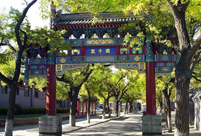 Global ambassadors of ecotourism gather in Nanjing
Global ambassadors of ecotourism gather in Nanjing
 Taiwan woman marries into Kazak family, 100 sheep plus a flat as dowry
Taiwan woman marries into Kazak family, 100 sheep plus a flat as dowry
 College girls take graduation photos under water in Chongqing
College girls take graduation photos under water in Chongqing
 Cartoon: Xi and football
Cartoon: Xi and football
 Chinese influence sweeps ROK
Chinese influence sweeps ROK
 Post-90s beauty boxer grapples four men
Post-90s beauty boxer grapples four men
 3,000-year-old tea town through lenses
3,000-year-old tea town through lenses
 22 archaeological sites along Silk Road in China
22 archaeological sites along Silk Road in China
 Football babies, Samba dancers embrace 'World Cup'
Football babies, Samba dancers embrace 'World Cup'
 Beautiful scenery along China’s Grand Canal
Beautiful scenery along China’s Grand Canal
| Henry M. Paulson (File Photo) |
People’s Daily: This year is the mid-term election year in the U.S. Will this election have some negative impacts on U.S.-China economic relationship?
Henry M. Paulson: China has not yet been a major issue, and I doubt it will be. But it should surprise no one that candidates of both parties are critical of China. This frequently happens in U.S. elections. Cooler heads always seem to prevail, and what’s more, the policy challenges are now so great that the U.S. government, no matter which party leads its various branches, will need to find ways to build a productive relationship with China. But structural changes, especially in our economic relationship, are also helping to fuel this. It is important to take note of these: First, the American economy is resilient, but we are likely to be facing difficult economic circumstances for some time. In that environment, countries historically have become more protectionist. The U.S. is one of the least protectionist countries in the world, but Americans want a level playing field and while they don’t mind competition, they expect that competition to be fair. I think there is going to be more debate in years to come about whether the playing field in China is sufficiently level for U.S. firms and exports. Second, domestic politics are changing in both the U.S. and China, as the relationship is becoming more complex and supportive political-business coalitions fracture and fray. This affects the debate in the United States because the old political-business coalition that helped grant permanent normal trading status to China is stressed and fraying and even the most successful U.S. firms confront new challenges in the Chinese market. Third, as China moves up the value chain, economic competition is heating up. So I predict we will hear criticism from time to time in both the U.S. and China. But I expect cooler heads to prevail on both sides. I would emphasize as well that this makes it more imperative for us to forge a positive economic agenda—for example through negotiation of a Bilateral Investment Treaty.
People’s Daily: The U.S. is pushing for conclusion of TPP. Some commentaries call it an ABC (all but china) pact, which is regarded as a containing China tool by the U.S. government. What impacts do you think TPP will have on future U.S-China economic relationship, and to speak more broadly, how will it affect the structure on trade and economy relationship in Asia and Pacific?
Henry M. Paulson: I am strongly supportive of the TPP and have urged President Obama’s administration to take the necessary steps, including pursuing so-called fast-track “Trade Promotion Authority,” to help bring it to an early conclusion. Most trade agreements have focused on tariff reduction “at” the border. But there has been so much of that in recent years, that TPP is an effort to address issues “across” the border and “behind” the border, such as competition policies that limit the flow and benefits of trade among member nations. The focus of the negotiation is not this or that country but rather an attempt to agree on a set of high standards to facilitate increased trade. TPP was not an American idea but an idea that originated with some APEC members, including Brunei, Singapore, Chile, and New Zealand, who saw advantage in having some first-movers within APEC lead the way to regional trade liberalization. The U.S. embraced that idea because it saw the potential for such an agreement at a time when an APEC-wide FTA simply is not realistic. And I’m struck that, in recent months, TPP seems to be generating positive interest among some in China. TPP is a genuine positive for global and regional trade.
People’s Daily: China and the U.S. are negotiating Bilateral Investment Treaty. How do you think of the prospect of U.S.-China investment relationship? How will the two-way investment affect bilateral economic relationship? Besides investment, which areas do you think have the most potential for the two countries to work together, to further bilateral economic relationship, and maintain a cooperative and win-win relationship?
Henry M. Paulson: As I said in reply to your earlier questions, I strongly support the early conclusion of a strong and transparent U.S.-China BIT. A BIT isn't just a statement of principles or a set of abstract commitments agreed to at a bilateral dialogue. It is a legally-binding treaty that would extend needed investor protections to both American and Chinese businesses. For American businesses that want more access in China, a BIT would help level the playing field and assure access by eliminating discriminatory policies and practices.
Chinese direct investment would also help support or even create American jobs. For Chinese investors that want a more predictable environment for direct investment in the United States, a BIT would extend important protections as well. China needs economic reforms and more commercially oriented firms. And like the WTO in the 1990s, negotiation of a BIT could help encourage the very domestic reforms in China that, ultimately, can help expand its market and make our economies more complementary. Indeed, BITs are transformative because they can improve investment conditions for domestic as well as foreign investors. When a government agrees in a BIT to protect foreign investors, it naturally faces political pressure to give domestic investors the same rights. In this way, a U.S.-China BIT could give a boost to domestic reforms that would help to improve conditions for Chinese investors in China, just as they will be positive for U.S. and Chinese firms that seek to invest in our respective economies. Importantly, by building mutual trust, a BIT should lead to more two-way investment flow. I was very pleased to see China’s decision at last July’s S&ED to engage in BIT negotiations on the basis of a “negative list.” That was an important step that should help our governments to conclude an agreement. I encourage both sides to seize this opportunity and make rapid progress.
 |
 'Seattle's soulmate' - -Pike Place Market
'Seattle's soulmate' - -Pike Place Market Human skeletons of more than 1,600 years old
Human skeletons of more than 1,600 years old BFA goddess poses for graduation photos
BFA goddess poses for graduation photos Separate college entrance exam
Separate college entrance exam Flash mob dance
Flash mob dance Featured hutongs in Beijing
Featured hutongs in Beijing Picturesque scenery of Ghost City
Picturesque scenery of Ghost City Female special assault team in training
Female special assault team in training Children attend First Writing Ceremony
Children attend First Writing Ceremony Chengdu police use social media to boost recruitment
Chengdu police use social media to boost recruitment Secrets unveiled in restoration of the 800-yr-old Buddha
Secrets unveiled in restoration of the 800-yr-old Buddha Heavenly path in Chongli grassland
Heavenly path in Chongli grassland Happy Birthday to "Yuanzai"
Happy Birthday to "Yuanzai" China's manned submersible Jiaolong opens to public
China's manned submersible Jiaolong opens to public Roast Duck Restaurant celebrates 150th anniversary
Roast Duck Restaurant celebrates 150th anniversaryDay|Week|Month